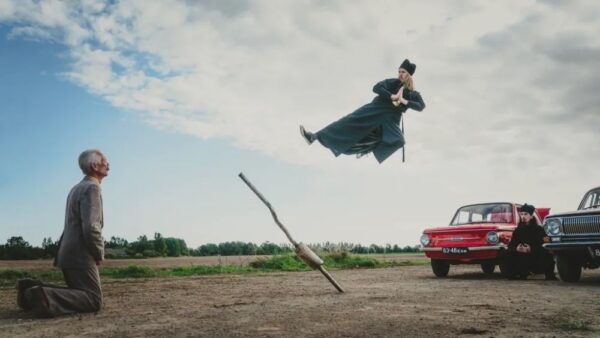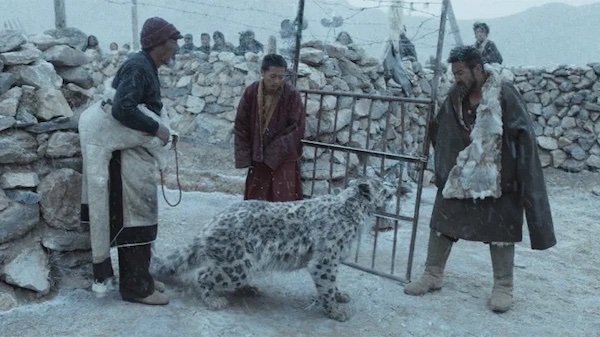Dispatch from The 2023 Warsaw Film Festival
By John T. Maier
A rundown of some of the strange and beautiful movies screened in Warsaw. Let’s hope they are scheduled for a digital and theatrical release in the United States.

A scene from Aniela Gabryel’s documentary Radical Move.
“There is more than one way to be a monk,” remarks one of the performers in Aniela Gabryel’s Radical Move, a new Polish documentary shown at the Warsaw Film Festival last month. The movie follows a team of performers — the word does not seem quite right, but neither does actors, singers, students, or disciples — who are giving themselves over to a form of theater that they describe as “The Work,” under the strict if charismatic leadership of a man named Thomas Richards.
The Work itself is captivating — a mix of song, movement, and scenes — but still more so are the performers’ stories of what they have given up for it. One discusses canceling a trip to see his dying aunt, seemingly at Richards’s behest. Another one shares that she abandoned her lifelong desire to have children. Like fictional movies in this genre — one recalls Damien Chazelle’s Whiplash, as well as Lars von Trier’s early masterpiece The Idiots — the movie generally manages to maintain a certain ambiguity about where precisely one draws the line between an all-consuming devotion to group work and, on the other hand, a cult.
Radical Move is set mainly in Mexico, with an international cast speaking mainly in English, just before the COVID pandemic. Yet it feels very much a movie of Poland in 2023. This is in part because Richards is himself a student of the Polish director Jerzy Grotowski, who speaks briefly at the outset of the movie. More than that, it is because the twin rigors of religion and war loom over it: as one performer compares herself to a monk, so do others compare themselves to soldiers. As it happens, the festival fell just before national elections in Poland, a referendum on the Law and Justice party, which has blurred the lines between the Catholic Church and the Polish state (it lost its majority after eight years in power). Meanwhile the war in Ukraine continued a few hundred miles away (the festival banned any Russian entrants).
“There is more than one way to be a monk.” Originally, this is a saying about the rigor and devotion required to excel at acting, or at any art. But it in fact applies to many of the films shown at Warsaw, which are addressed to the monastic paradox whereby one plunges into one’s own specific personality precisely in order to connect with something different, and far grander, than oneself.

A scene from Rainer Sarnet’s The Invisible Fight.
One of the most captivating and original movies at the festival was Rainer Sarnet’s The Invisible Fight, which is explicitly addressed to the many ways of being a monk. Its plot is not easy to summarize, but it roughly follows a young Estonian man who, when serving as a border guard for the USSR, encounters a band of men practicing martial arts and playing heavy metal, while wearing crucifixes. On his return to Estonia, his car breaks down outside of an Orthodox monastery, where he is taken in by monks who teach him, among other things, a particularly Christian form of kung fu. In his new home, the man acquires powers of his own and he may, or may not, be a saint.
What is this all about? About monasticism, of course, and heavy metal. But most of all about the fact that there are always new ways of making a movie, and that we often find these far from the familiar places. Werner Herzog remarked on Gates of Heaven: “You don’t know where the US is standing after a State of the Union Address, but after seeing that film you will know.” It is often in its peculiarities that a nation reveals what it cares about, which is how Errol Morris’s documentary about pet cemeteries could be one of the best movies about America. So too may this movie about heavy metal monks be one of the most intriguing movies about the enduring aftermath of the Soviet Union.
Finally, one more movie about an unusual monk: Pema Tseden’s Snow Leopard. Tseden passed away, at the age of 53, in May. This is his penultimate film; it premiered earlier this year in Venice and was shown out of competition here. Tseden had been the leading Tibetan filmmaker working in China, the first to make large-scale films with a realistic portrayal of life in contemporary Tibet. His premature death is a major loss to film, and this riveting film, which has more than a touch of the autobiographical, is a fitting remembrance.

A scene from Pema Tseden’s Snow Leopard.
It is all shouting and silence. On the one hand, the snow leopard that has been caught by sheep farmers, enraged at the Chinese bureaucrats who insist it is a protected species. On the other, the immensity of the Tibetan plateau where the farmers and the leopards have long cohabited. The story is told through the eyes of two Tseden-like figures: a young journalist in intellectual glasses who is covering the story while trying to connect with his girlfriend by phone, and his college classmate, who has become a monk, with an obsession with taking photographs of snow leopards on a high-end digital camera. The monk remarks that the other monks find his obsession unusual and even slightly improper, but the movie conveys a sense of how precision in filming can be its own form of devotion.
There were a number of other strange and beautiful movies in Warsaw, not all of them about monks. Chen Yanqi’s Day Tripper follows an assemblage of characters through one bleakly funny day in northern China. It is reminiscent in moments of the late Hu Bo’s great An Elephant Sitting Still, with a touch of Wes Anderson in the visuals. Another immediately captivating film was Diego del Rio’s All the Silence, about a sign language teacher who is slowly losing her own hearing. It is a whirl of signification, with signing and Spanish dialogue subtitled in English and Polish, but the most haunting scenes are the quietest ones, like the loving shot of a sunset traffic jam, as experienced by someone who does not hear it.
All of these films deserve to be seen. The Invisible Fight is tentatively scheduled for a digital and theatrical release in the United States in 2024. All the Silence is slated to be released on Amazon Prime Video. Radical Move, Snow Leopard, and Day Tripper do not yet have release dates.
John T. Maier is a philosopher and psychotherapist based in Cambridge, MA. He received his PhD in Philosophy from Princeton and his MSW from Simmons University. He has written for Psychology Today and Slate Magazine, and has a book on addiction forthcoming with Routledge.
Tagged: Aniela Gabryel, Chen Yanqi, Day Tripper, Jerzy Grotowski, Pema Tseden, Radical Move, Snow Leopard
